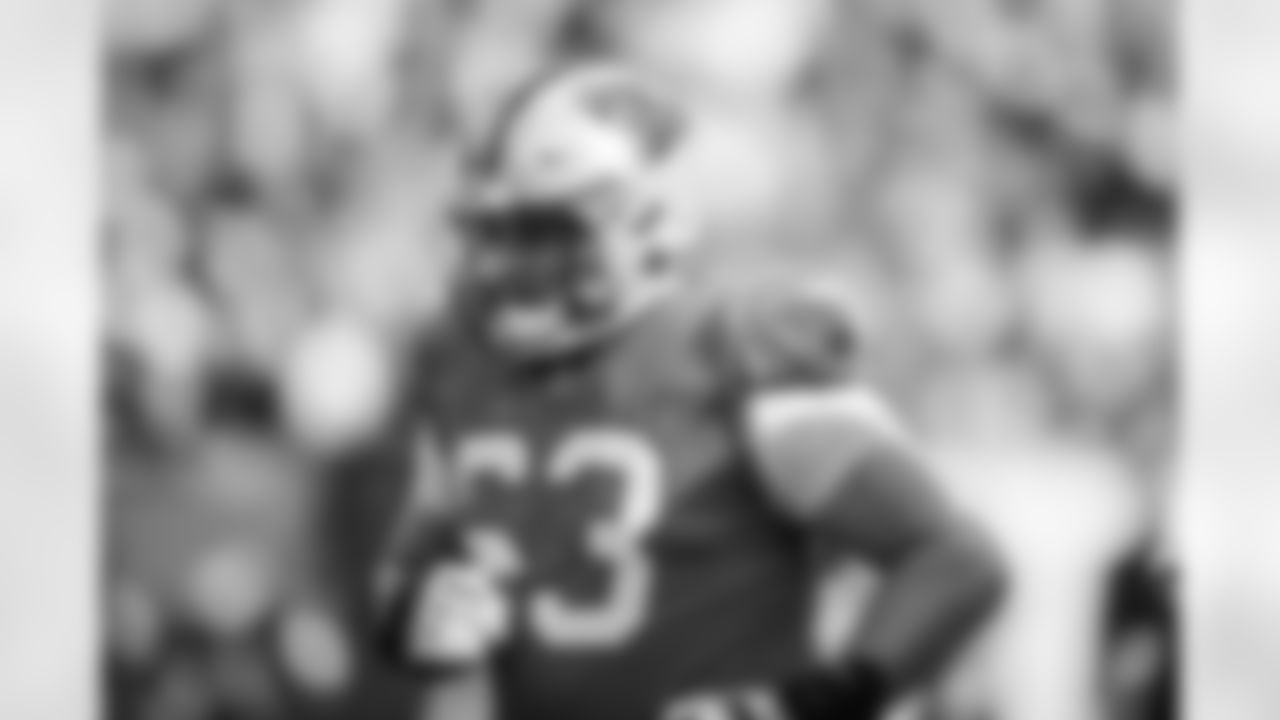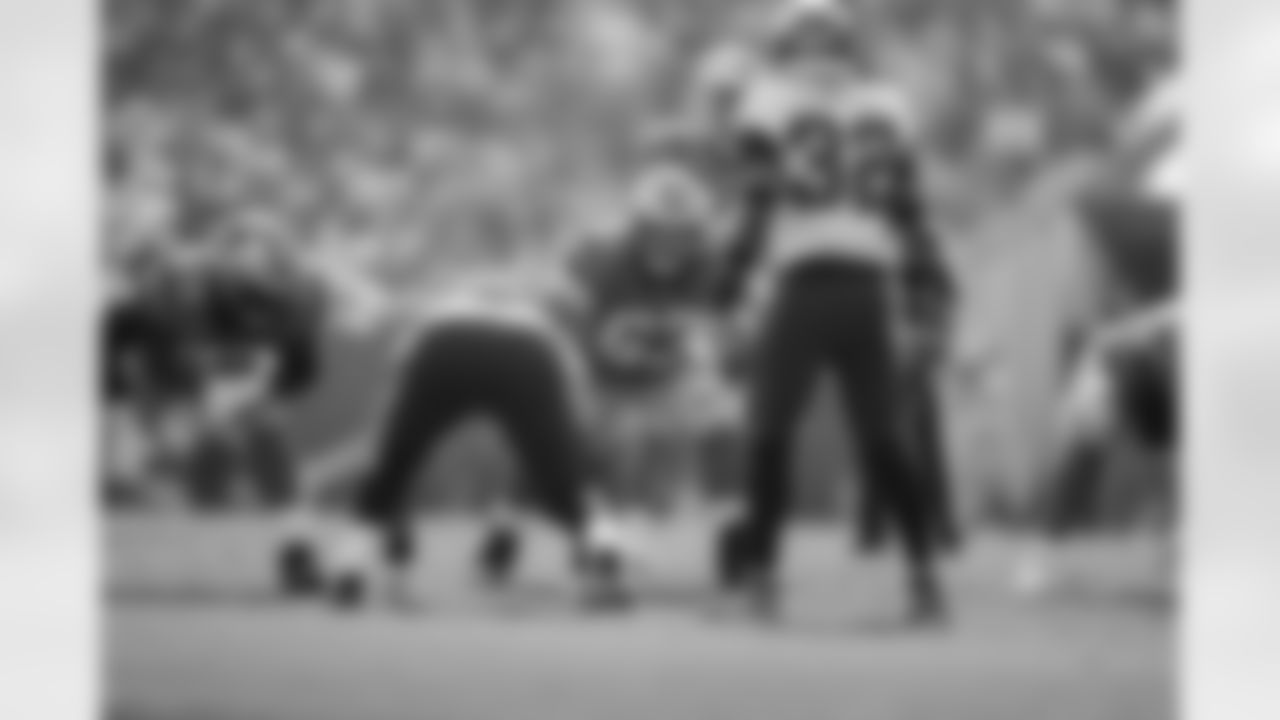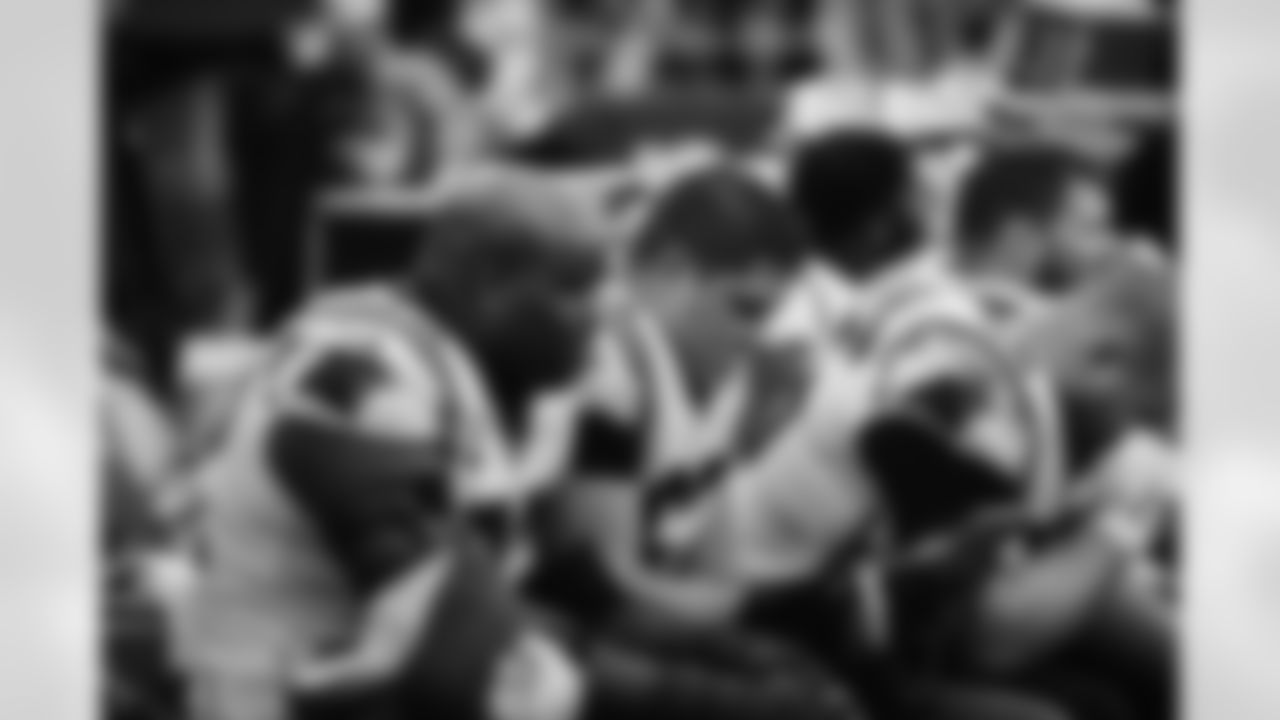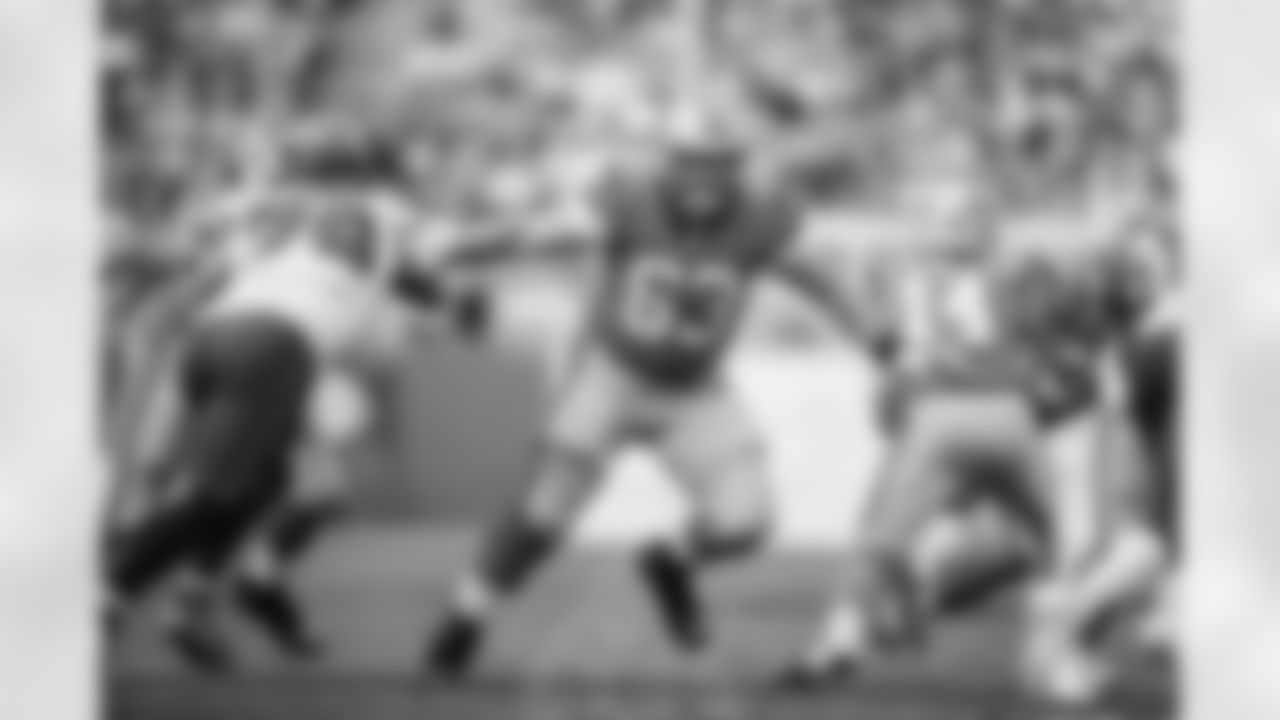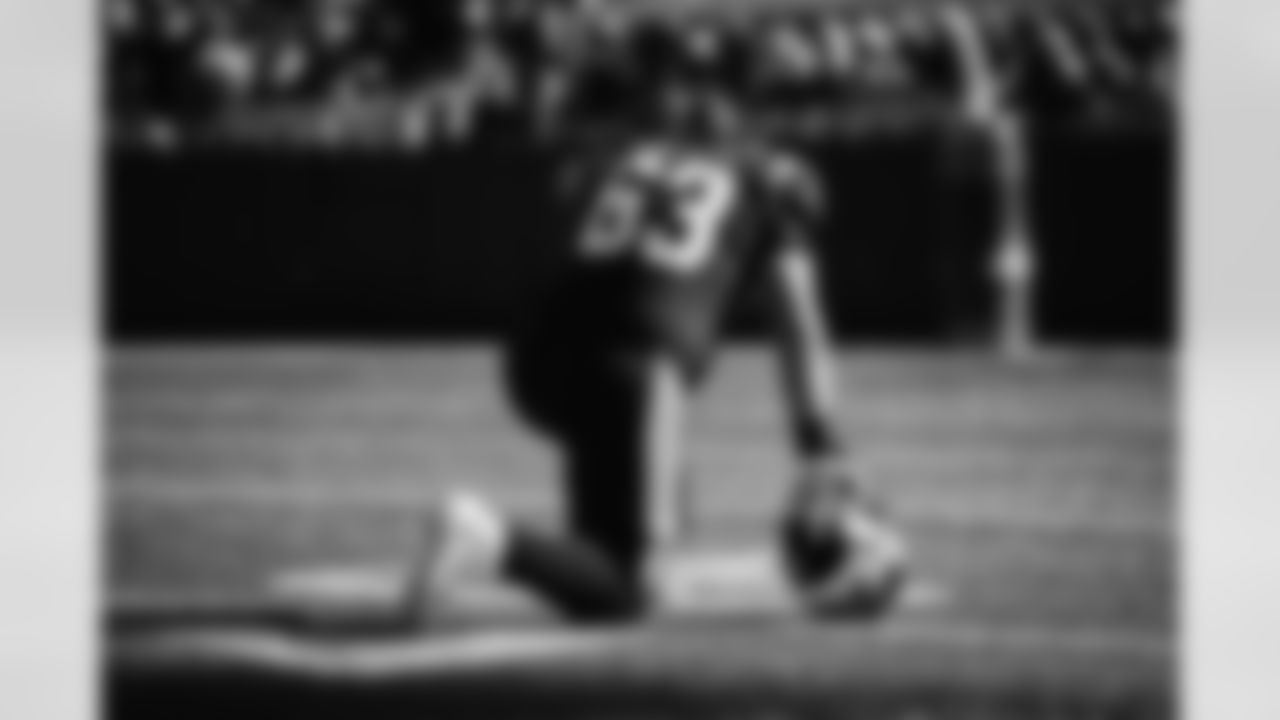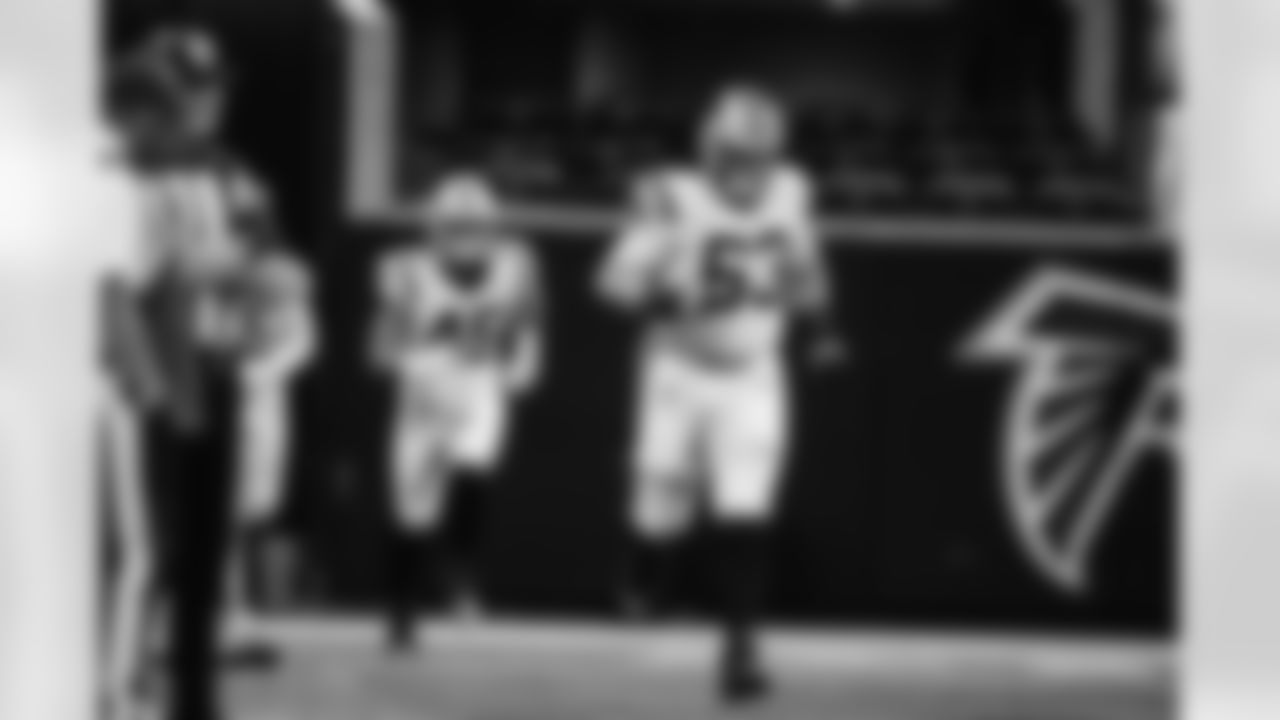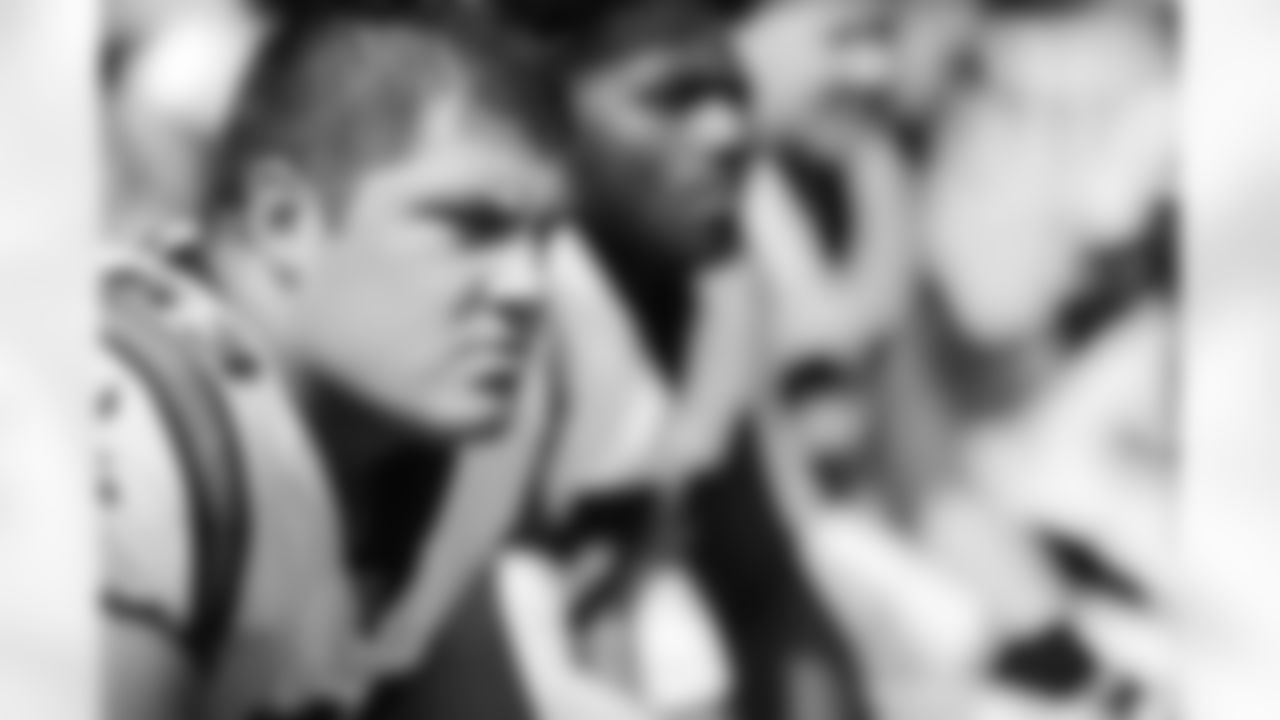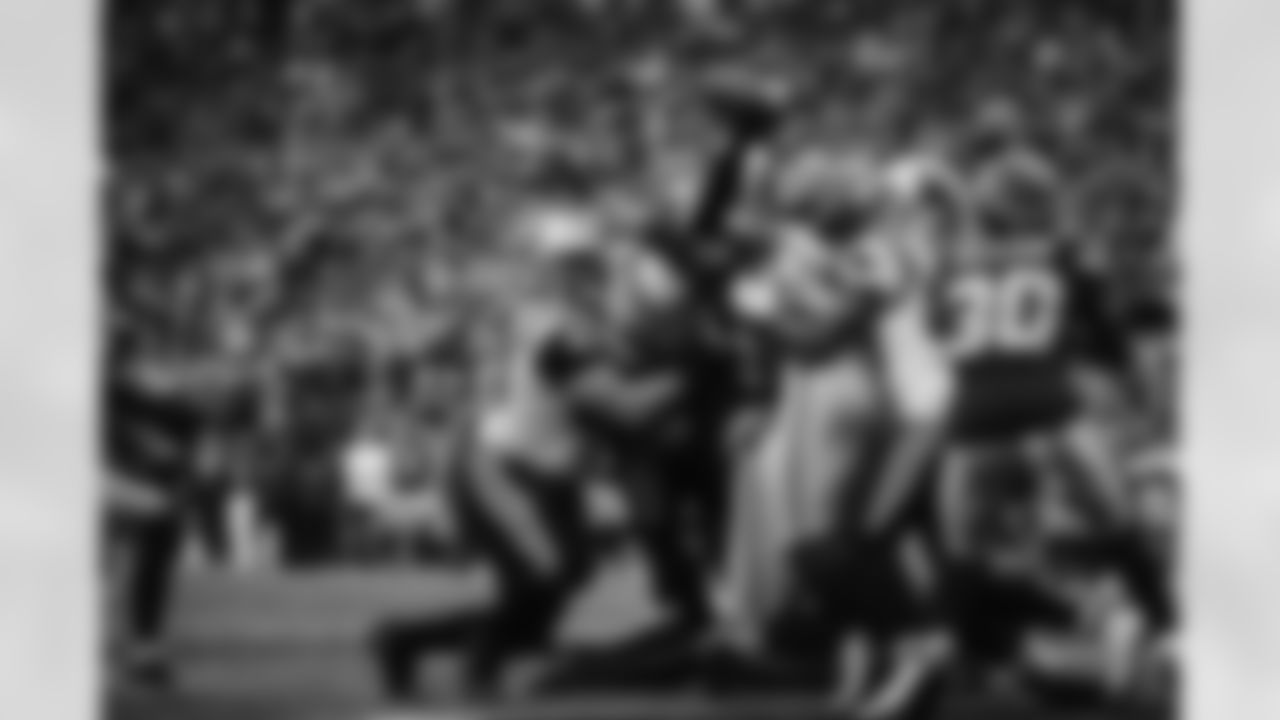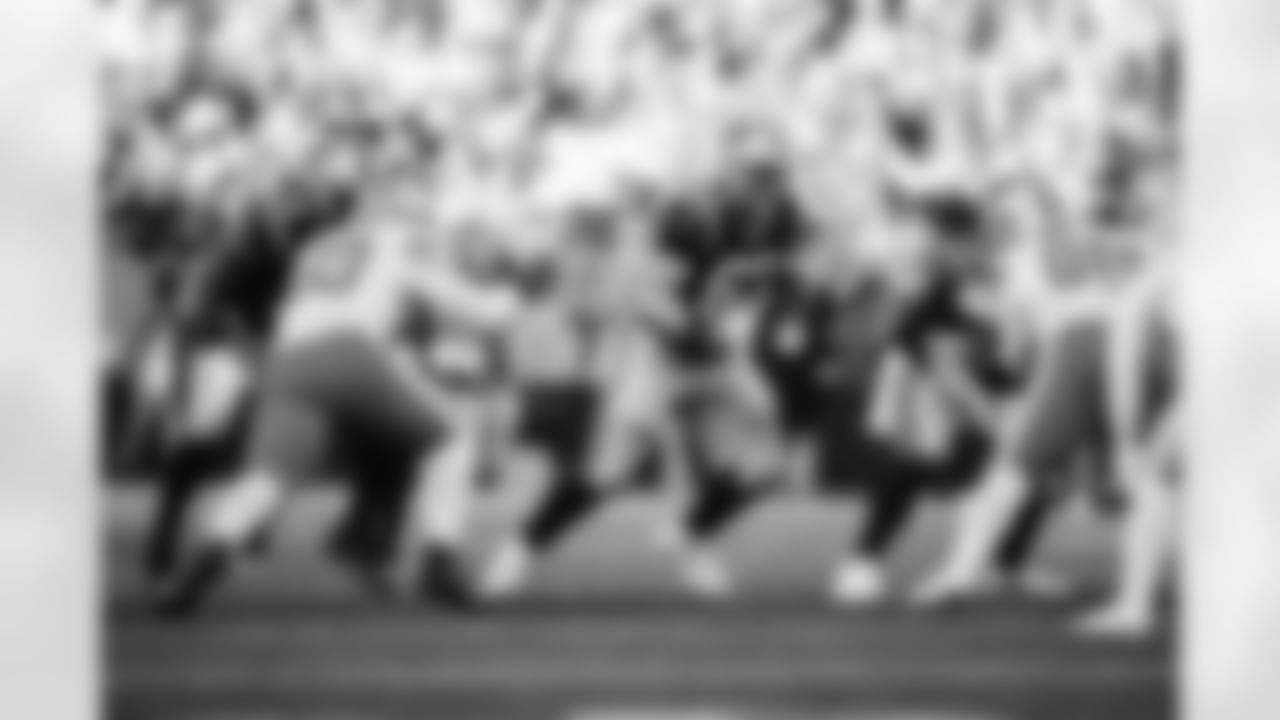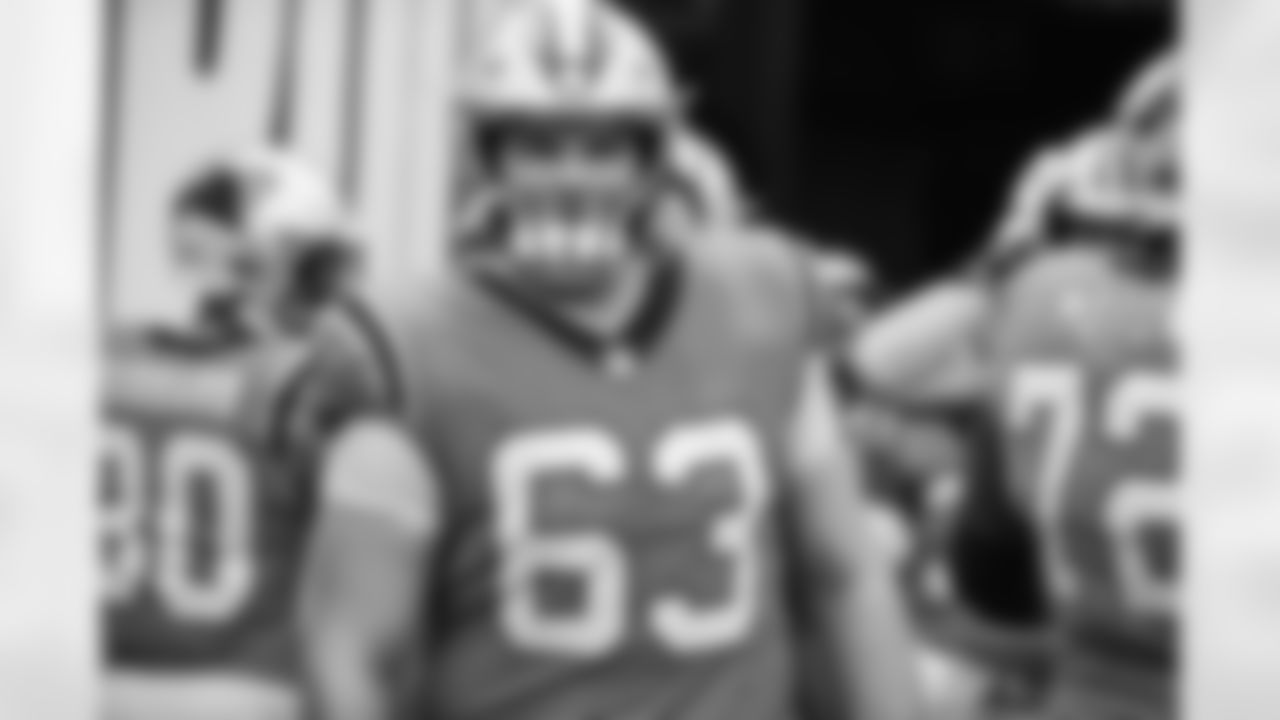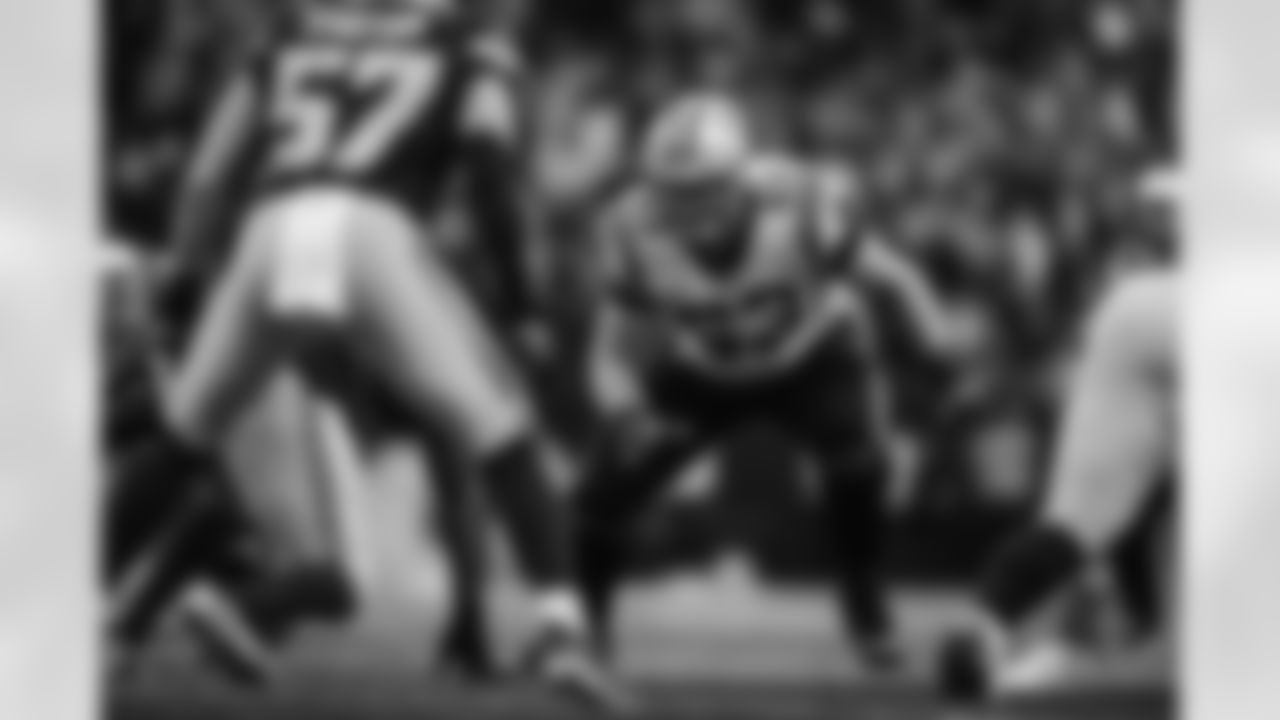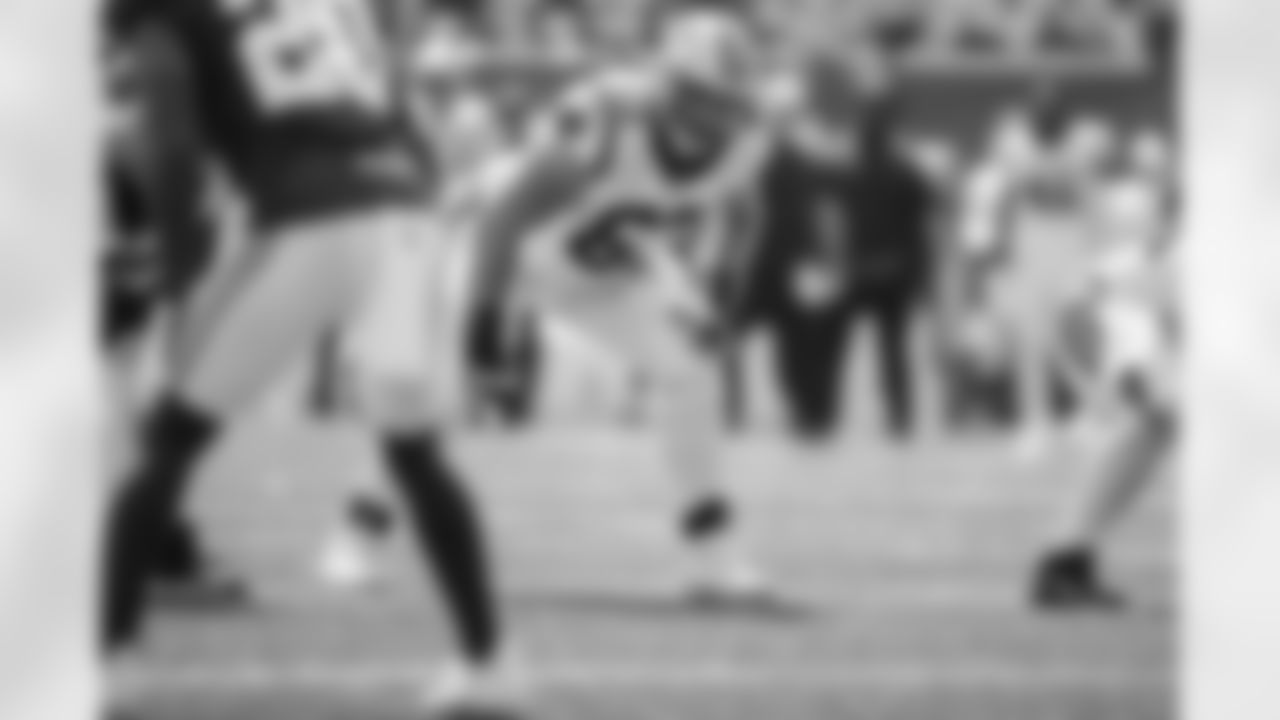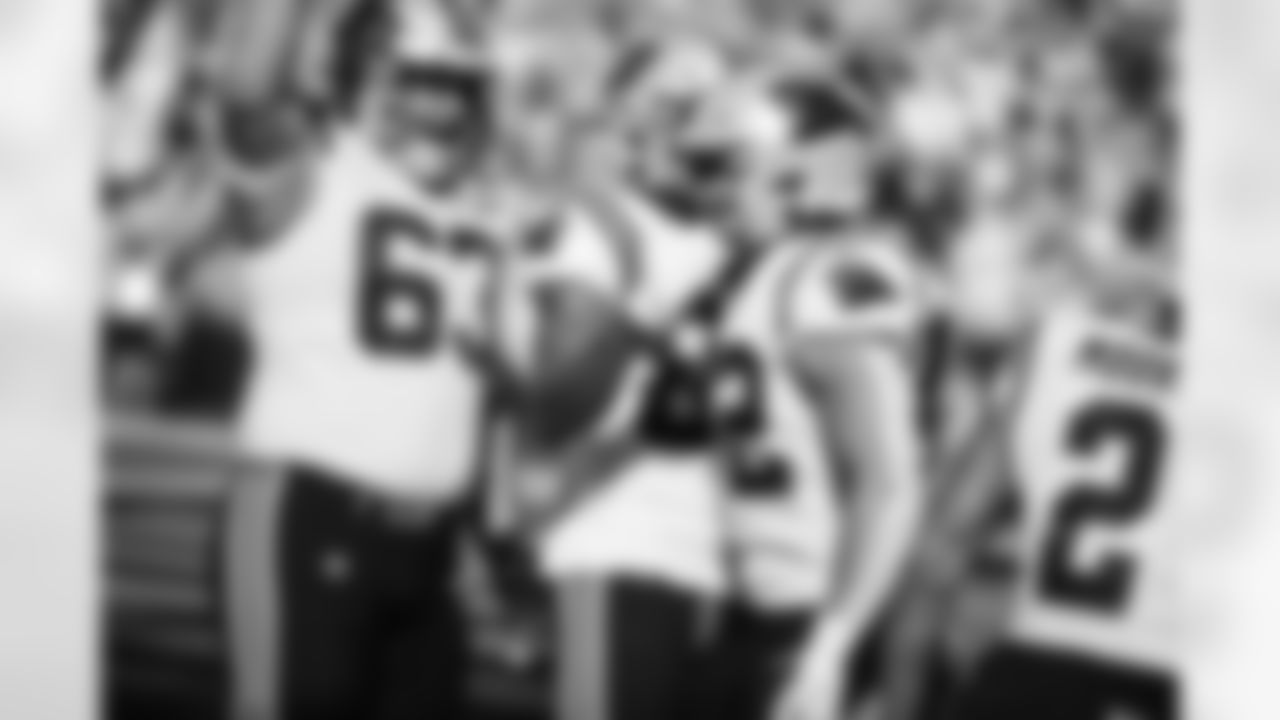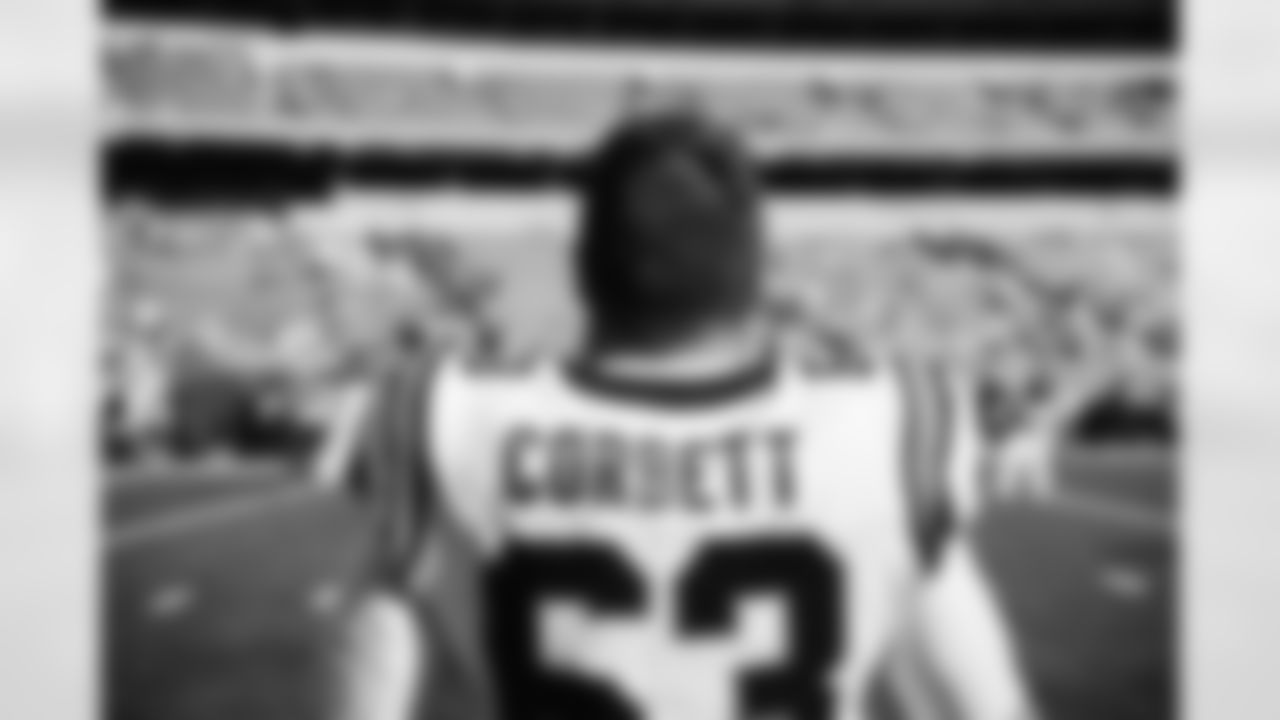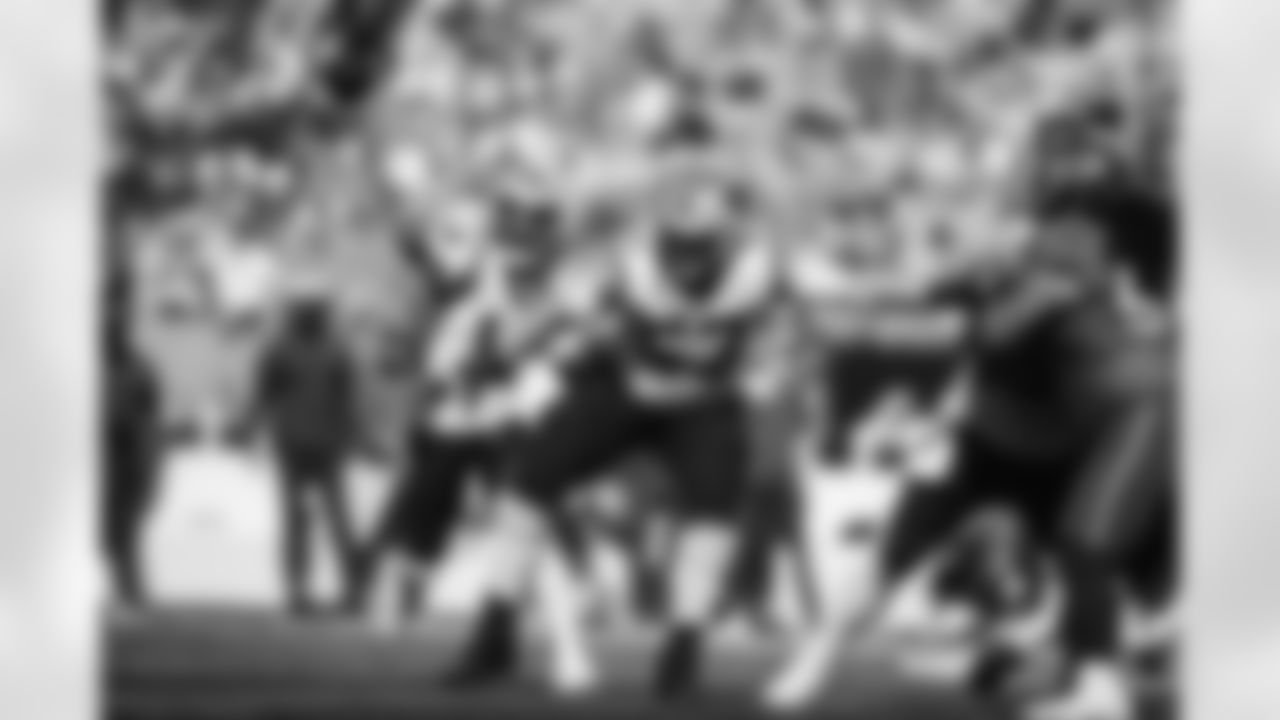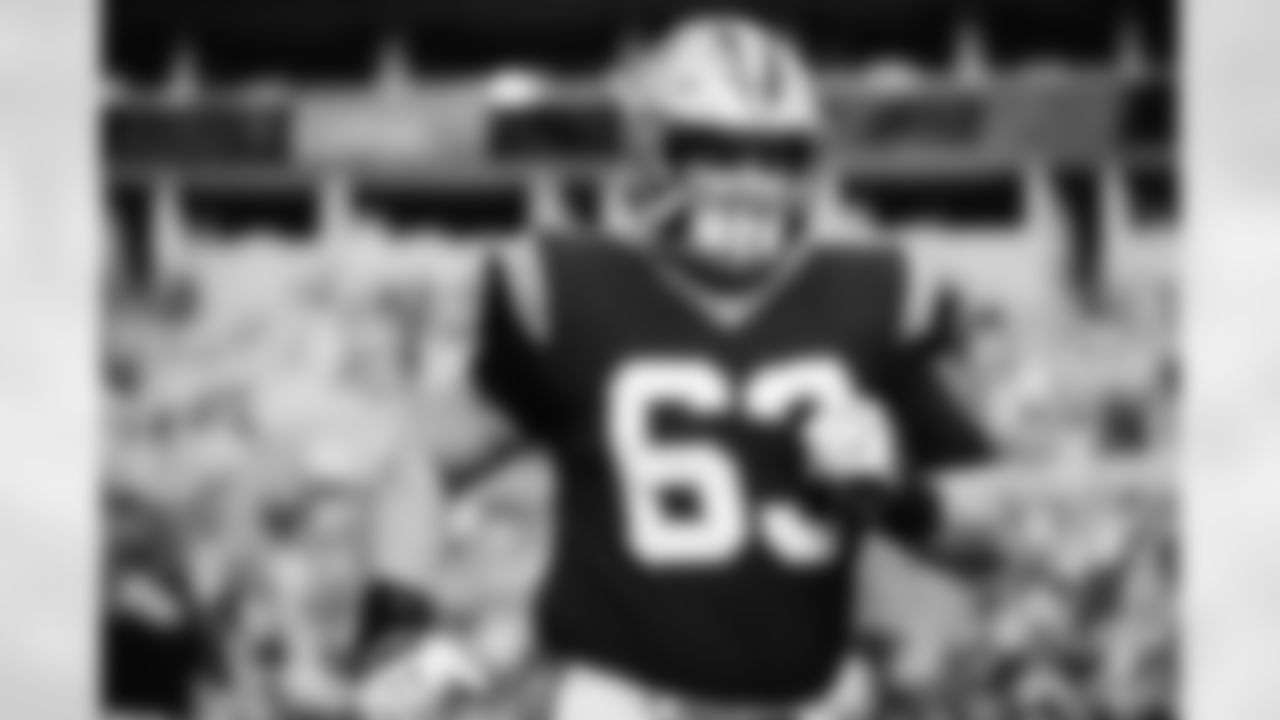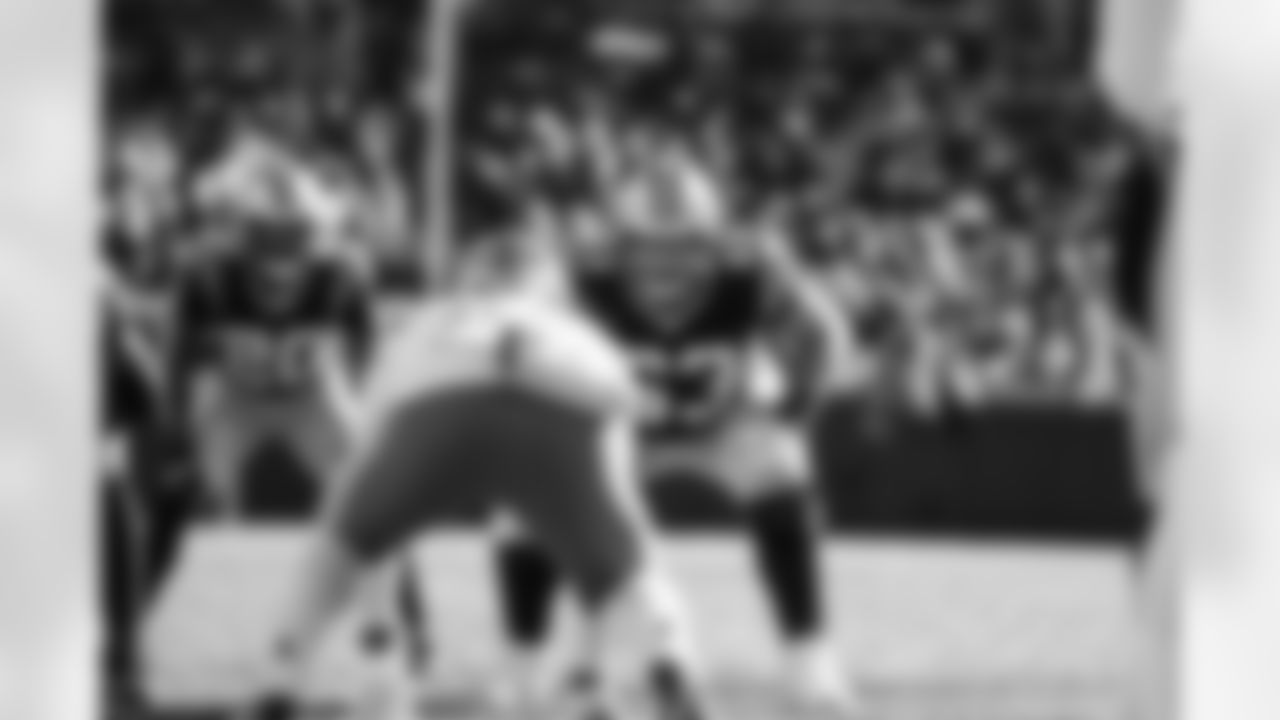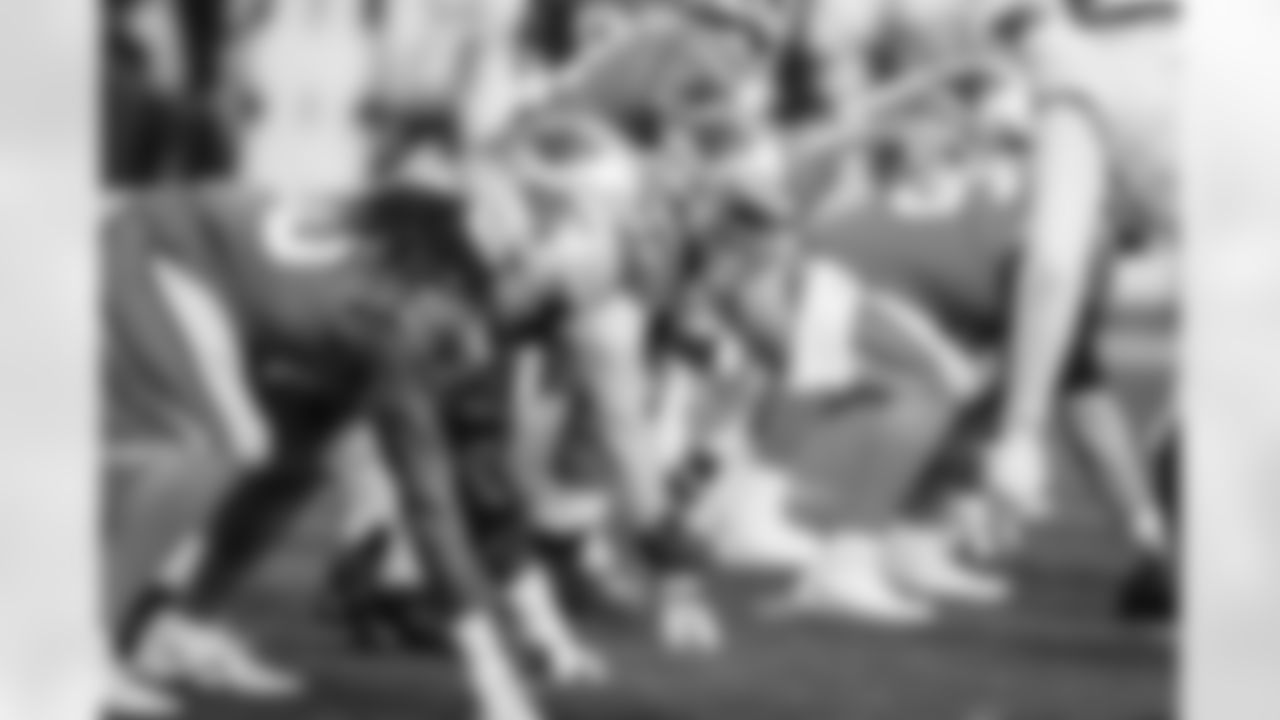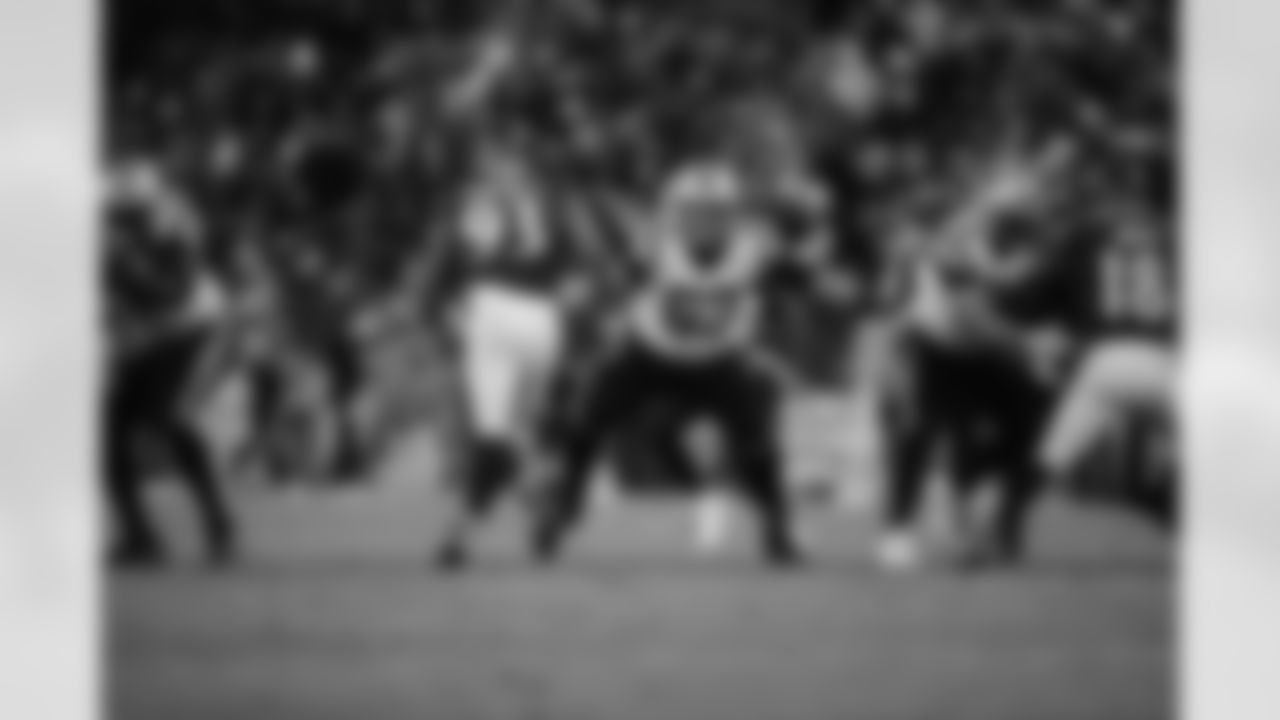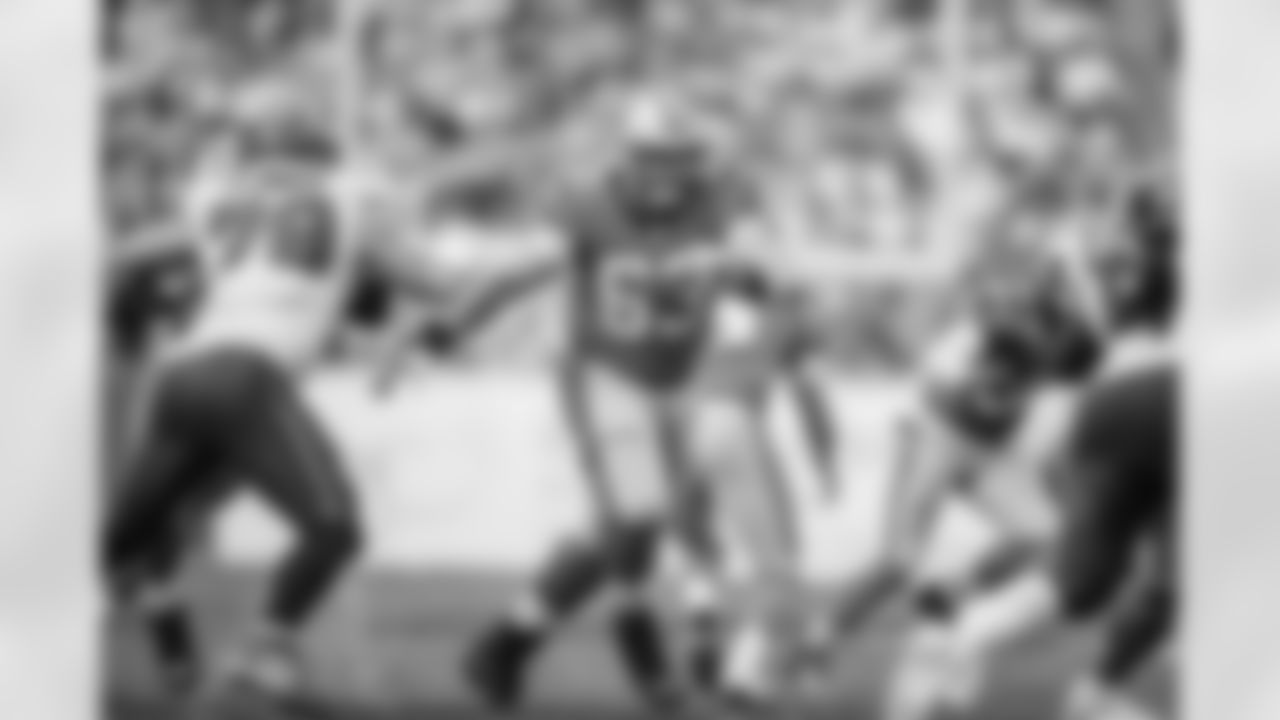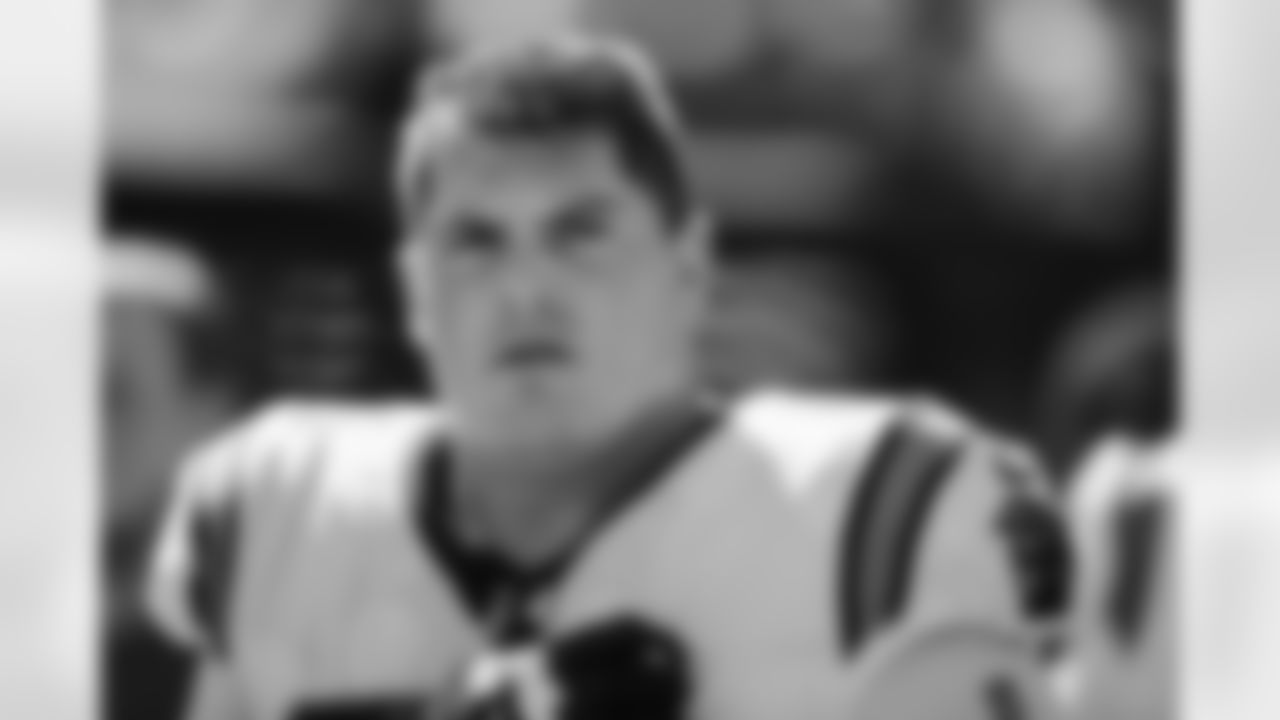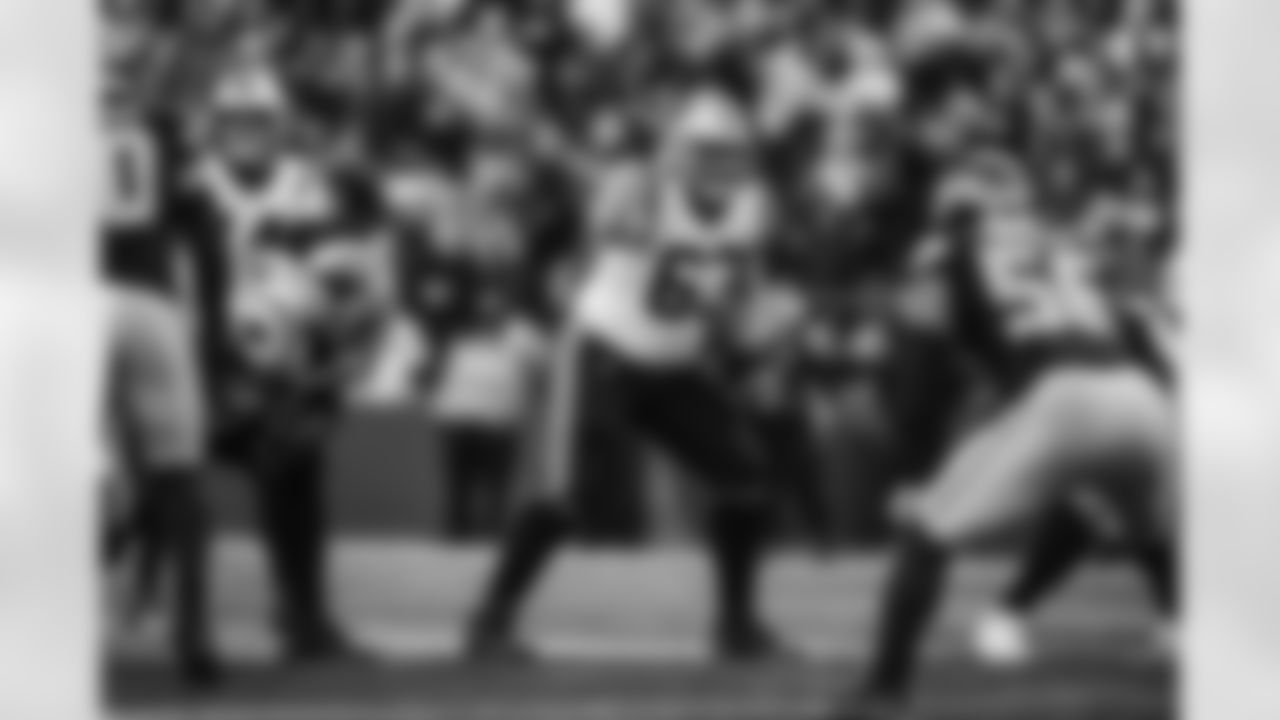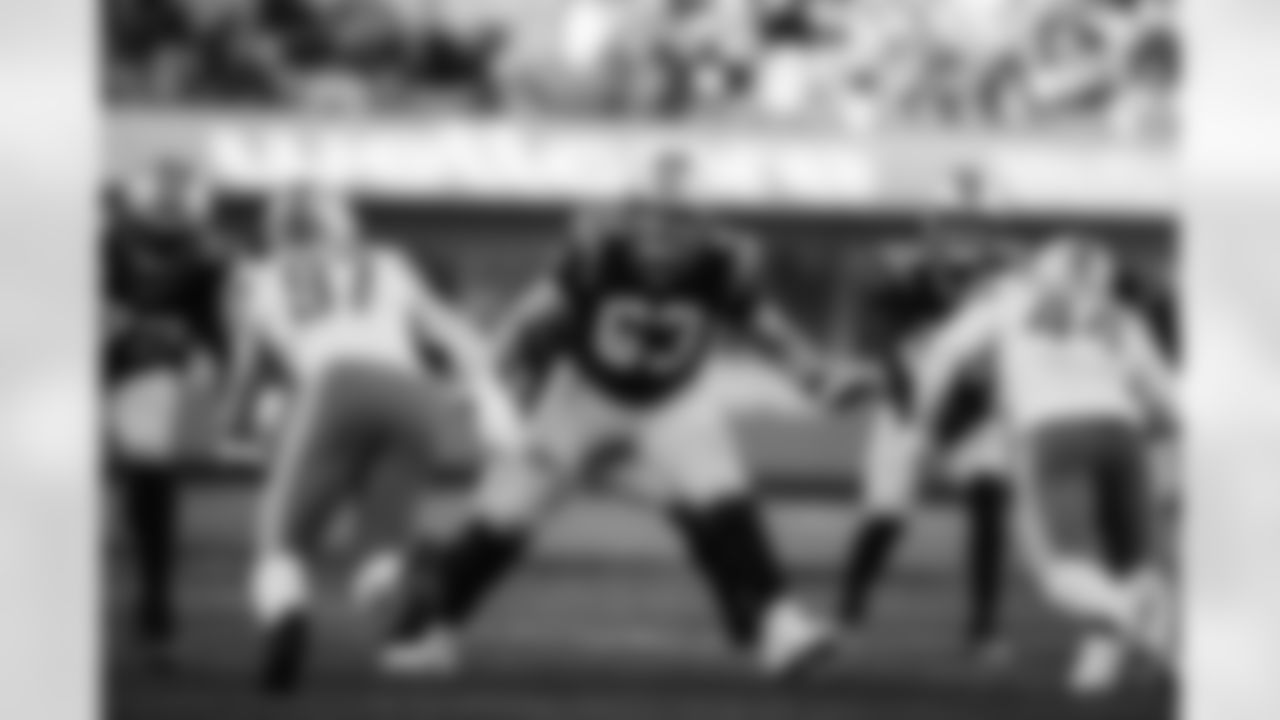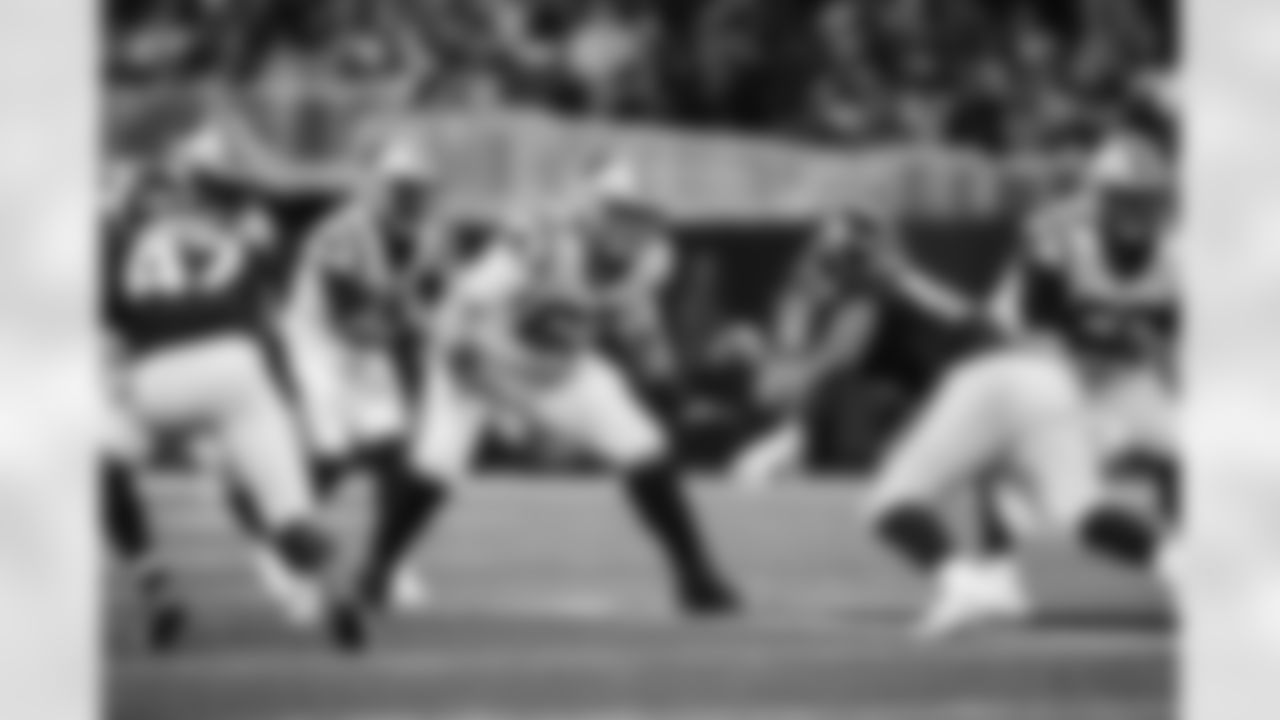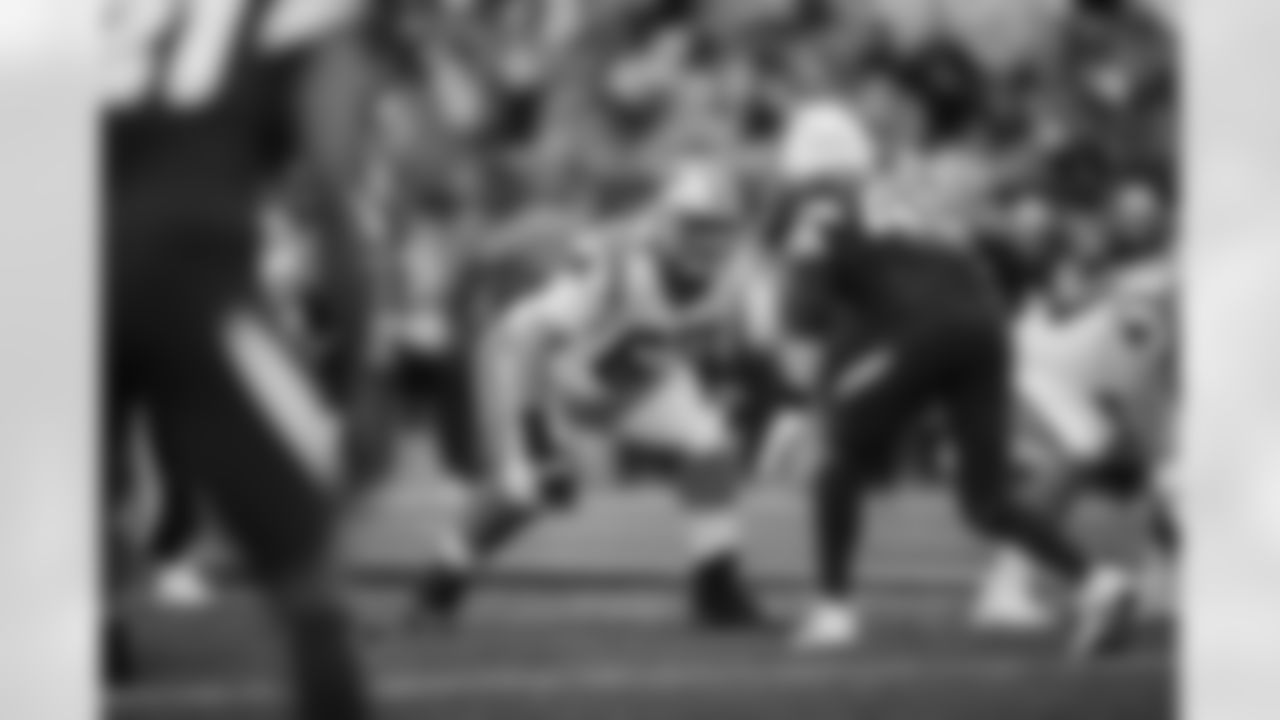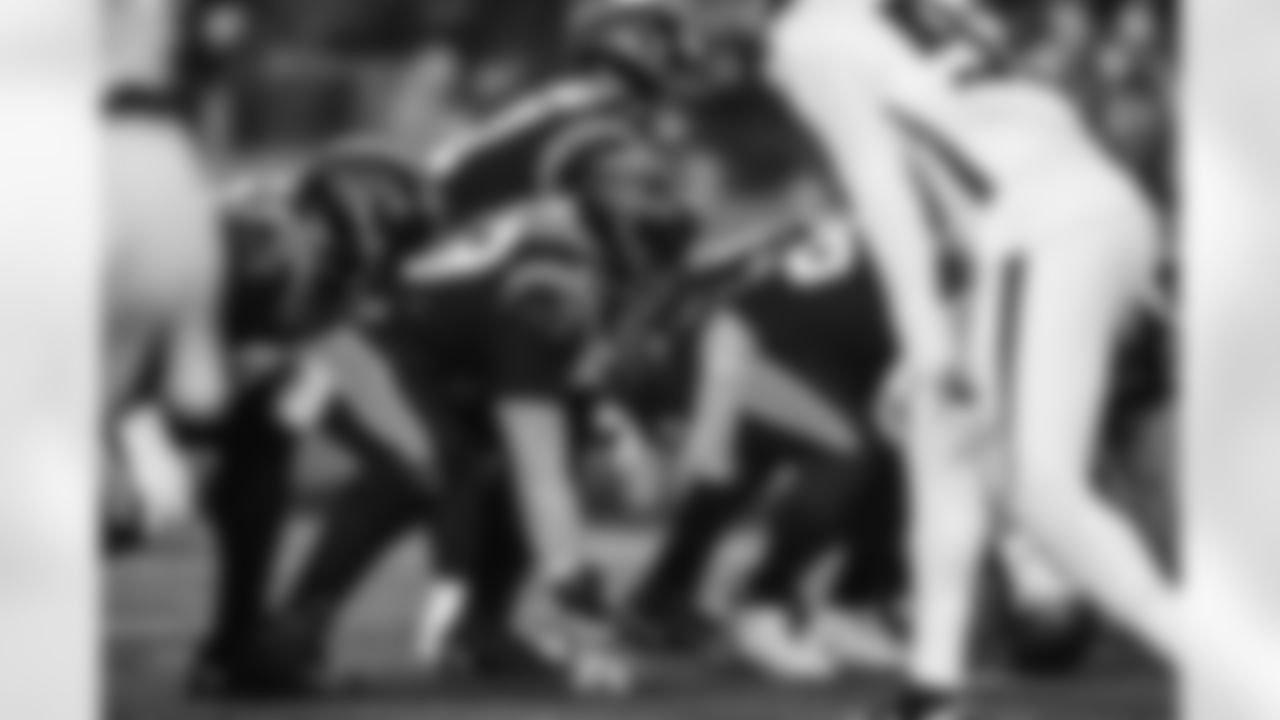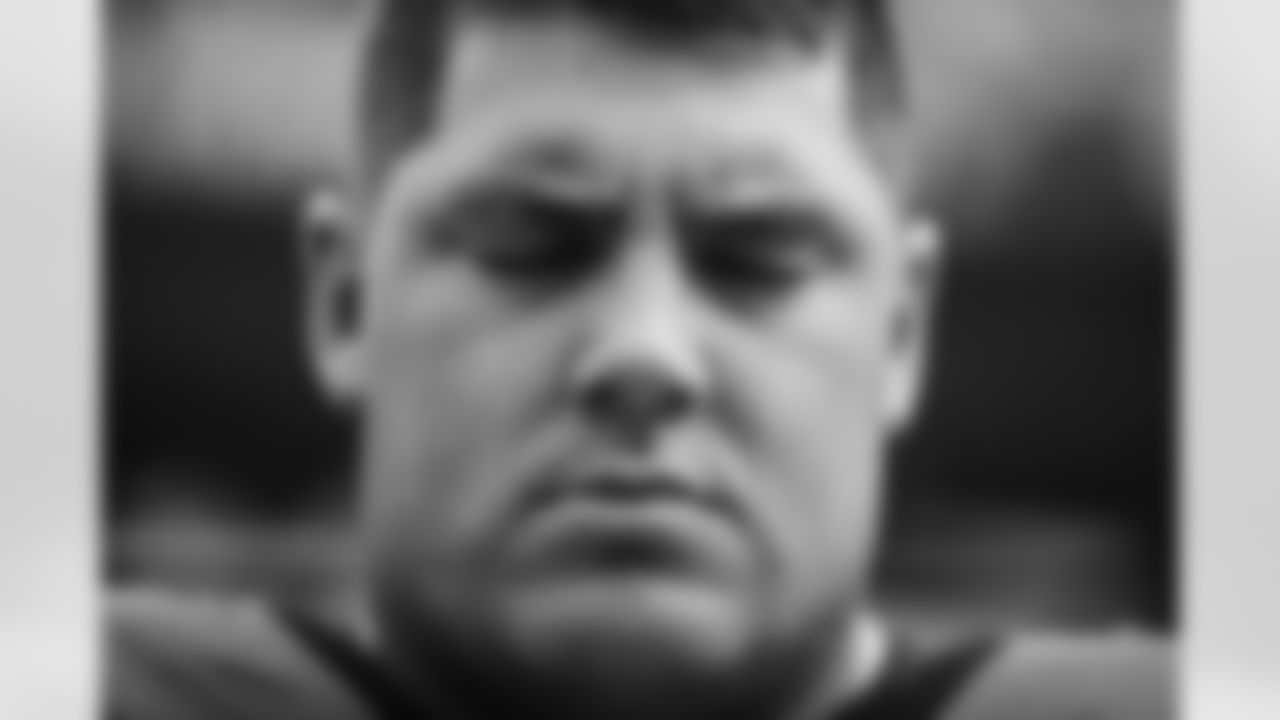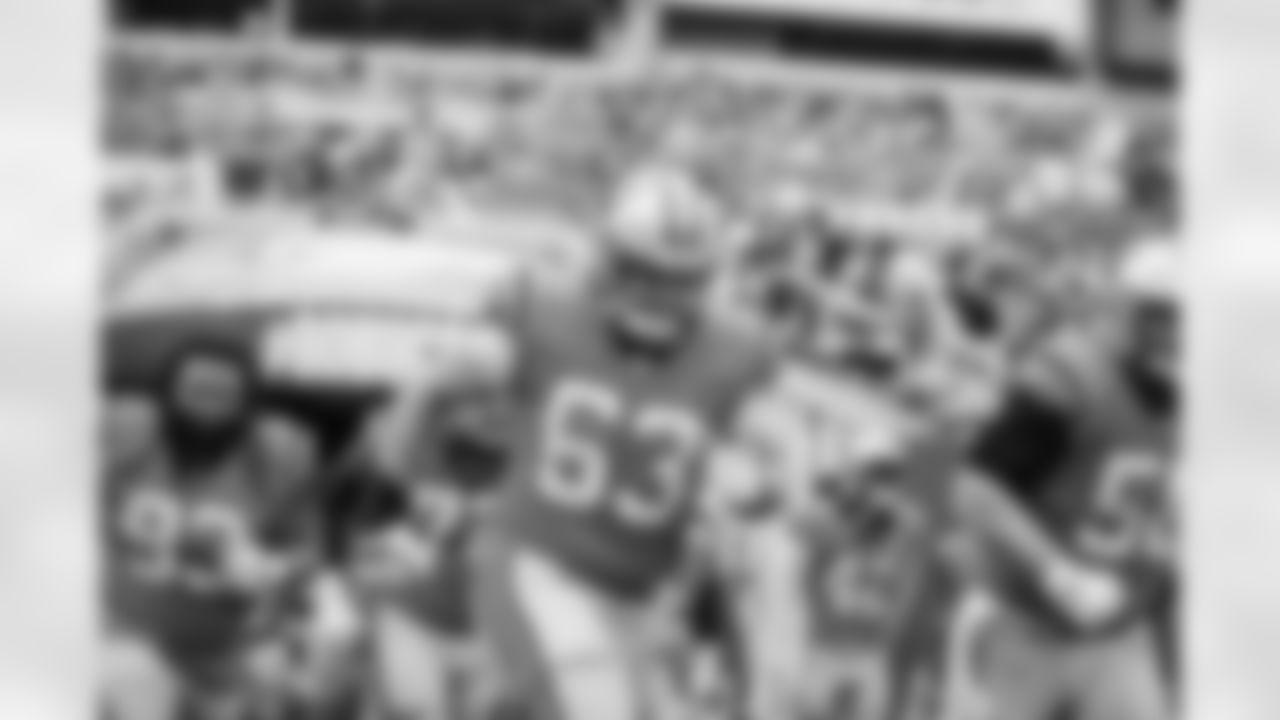Panthers right guard Austin Corbett suffered a torn left ACL on Jan. 8 in the regular season finale against the Saints. He has agreed to take us inside the rehab process, explaining his perspective on what coming back from the injury entails from a physical and an emotional standpoint and what the months of work to return actually look like as they're happening. This is his story, as it unfolds.
Read the first installment in the series here, the second month here, and the third month here.
CHARLOTTE — Austin Corbett's back in the weight room, and so are his teammates again, so things are beginning to feel a little more normal.
Then again, he's still months from practicing, lifting way less weight with his left leg than his right leg, and that left knee swells up every time he eats a hamburger, so things are far from normal. And oh, by the way, he saw (but didn't hear) his employer draft a guy who plays his position and then heard his coach acknowledge that he probably wouldn't be ready for the regular season opener.
Other than that, totally normal.
Corbett just grinned and shook his head about the latest steps and the latest twists in his comeback story.
"No, just because it really is still so far away, right?" Corbett said, when asked if it becomes a little more real when those last two items on the list happen. "There's still a ton that I'm progressing through and getting through, and obviously, it's always there. Right? But just don't think about it.
"Yeah, it's no fun to think about missing games. Focus on today. Right?"
While he said that, Corbett was sitting behind what for him is a normal lunch, normal in the way that a highly trained and 310-pound human coming back from an invasive surgery eats.
There's a salad bowl the size of a cantaloupe crammed full of spinach, kale, some other stray vegetables to make it colorful, and a fistful of chickpeas and chicken strips. Then there's the side of fish — what appears to be an entire fish.
He has to be very particular about the things he puts in his body always, but especially now that he's recovering from an injury. Fortunately, he has help.

Director of performance nutrition Kate Callaway works with all the players, helping them gauge their specific food and supplement needs every day. But when she's helping a player coming back from injury, the work is even more focused.
As staff athletic trainer Katy Rogers tells Corbett all the time, "inflammation is like traffic," so the goal is to keep things moving in there. Rogers and the rest of the athletic training staff work closely with Callaway and the nutrition staff because all the high-tech tools they use to fix the machine are less useful if the players are putting the wrong fuel in the tank.
"It always starts with what their baseline is anyway, which is one of the reasons it's important to get to know the players and what their routine is," Callaway said. "That's really significant. In this case, because Austin already has an excellent nutrition routine. Still, there are things we want to do to make sure we do to rebuild the tissue and reduce inflammation. That's absolutely one of the things that nutrition can influence and that multiple of us are working on. And then repairing and rebuilding of whatever tissues were interfered with. So his diet's already pretty good. Like, he's great. He does a great job with his nutrition; it's got a lot of anti-inflammatory foods in there already."
Whether it's the people in the athletic training room, the PTs, or the strength staff who work with him, many have mentioned that Corbett has always taken a pretty mature approach to getting ready and staying ready.
He admits that he allows himself on "cheat day" a week when he eats the way you think a 310-pound person would. But even that's still pretty calculated. Since the day starts at home (as opposed to the stadium where there are generally at least two but usually three structured meals a day, plus extras available for players), there are always eggs. Always protein. His son Ford is usually clamoring for pancakes, so those are a weekend staple.

"And then whatever sugary cereal is there to be enjoyed," he said with a laugh. Corbett can talk about cereal for many minutes at a time, weighing the merits of Cap'n Crunch with Crunchberries vs. Cinnamon Toast Crunch vs. Raisin Bran (no, really) vs. Honey Bunches of Oats. The point is, Saturday's the one day a week he's not measuring and weighing and being super careful with all the numbers and nutrients. But he also knows that the other six days a week, what he puts in his body and when has a huge impact on his recovery. He's always known that fried food and a lot of red meat aren't ideal, but now, he can feel the impact when he eats things on Saturday that he wouldn't normally eat the other six days a week.
"It's kind of interesting to see just kind of things that I eat, and the next day I'll wake up, and my knees will be a little bit more swollen," he said. "And so it's just being cognizant there."
Pasta's not bad, but things as detailed as the timing of the carbs he's taking in are part of his routine now. And as he does more and more physical work (now that he can), his nutritional needs go up. From his wife teasing him about his pants being baggy two months ago, he's building muscle mass back now, so he's putting more calories in.
"The hard thing with being 310 pounds was the amount of nutrients you need," he said. "Just to maintain – much less grow – to truly get it all by food is tough. ... Especially clean food, because anyone can go to Chick-fil-A and walk out with 1,100 calories. But this salad is probably worth 1,100 calories, and that's very, very different.

Callaway also keeps him stocked in supplements to get the things he needs that he can't shovel in with a fork or spoon. She'll tell anyone, all day, about the importance of dark leafy greens, and brightly colored foods. Hydration is a big element of it too, and some of the nutrients have to go down through a straw as well.
From collagen supplements (which are supported by vitamin C), to the tart cherry juice (high in anti-inflammatories) to turmeric supplements, which are mixed with lemon and honey to get them down, there are plenty of ways to add things to the system without eating them.
"My motto is to go with the food versions of things as much as you can," Callaway said. "But also because as football players, their metabolism is higher, their needs are greater, it's hard to get all the things you need from your diet when you have when you have to fuel that large of a body."
Callaway often says that Corbett is a good case study because he's conscientious. When he was off his feet for the first six weeks of non-weight-bearing recovery from surgery, they had to cut back on the intake at first since he wasn't burning it off. But after a few weeks, they ramped it back up to prevent the loss of muscle tissue. Callaway's not a cook; she's a scientist. And this stuff is all based on years of research when it comes to adjusting to injuries.
"It's not an even trade-off," she said. "It's not like your recovery from injury and your training are equal calories. So a lot of times (it's) more just adjusting the ratio of micronutrients versus cutting back, right?"
Still, there are times on Saturday when all he wants is a bowl of Blue Bell ice cream (his wife Madison is from Texas), and Callaway is also there to remind guys that's not the worst thing in the world either.
"A lot of times there is a mentality of everything's got to be, 'clean,'" she said, "Or that you only eat things that are good for you. And part of it is also eating stuff that tastes good and makes you feel good. And if you really love ice cream but you won't let yourself have it when you want it, then one day, you're probably going to go off the rails eating a ton of ice cream.
"So he knows how to balance things in that way."
Now, he just needs to get himself back into balance.
As if a bag of greasy fast food wasn't reminder enough, Corbett's left leg is different from the right, with the ligament that provides lateral stability torn during the final game of the season, surgically repaired by harvesting tissue from his patella tendon and then sewn all back together.
He feels it every day. But maybe never more so when he looks at the isolating leg press machine and sees a much larger stack of plates on one side than the other.
He was out of this sanctuary for the first month until the stitches were out and the wound was healed. An infection caused by sweat leaking into an incision site would have jeopardized the whole process.
"Obviously, the big O-lineman sweat just walking through their car, so we had to wait a while to get him back in here," head strength and conditioning coach Jeremy Scott said with a laugh.
But once Corbett was back in Scott's world, it wasn't the same one he left. Scott said he appreciated the investments owner David Tepper has made in the weight room because a lot of the specialized machines they're using are key to Corbett's recovery. Even when he was ready to do upper-body work, he couldn't just start bench pressing because he couldn't stabilize himself properly.

"It's whatever I can do safely in here to not obviously affect that area in a negative way," Scott said. "So let's say initially, especially right after surgery, it's hard to use free weights, so we usually start them on machine training. And, you know, Mr. Tepper has been great. We've been able to purchase a whole bunch of things in terms of modifications, so we have a lot of machines that allow us to do that types of stuff."
There's some degree of crossover training, strengthening the right leg while he couldn't use the left, but Corbett has obviously been limited in what he can do. Even when he began squatting, they used low-tech props like boxes to keep him from going too far. Strength is important, but the range of motion is key, so making sure he's using proper technique, and using it at the right times, is key for Scott and his staff.
And it will take months to get Corbett "evened up," for lack of a better phrase.
That could mean reps with 70 pounds on one side and 180 on the other are part of his life, and the gap will gradually decrease.
Scott said the warming up is as important as the lifting itself, since the range of motion determines how quickly he can proceed to the next step. So the difference between 60 degrees and 70 degrees is more important than the number of pounds. And working in conjunction with the athletic training staff, they'll go day-by-day through his progress and make sure he's making the incremental gains without setbacks.
Scott said one of the keys is making sure guys coming back from injury understand the small steps are significant ones. And they videotape everything, so they can go back and study it and make sure the form is correct. There are also scores of digital monitors in the weight room that measure everything from force to speed of the bar, another piece of feedback to motivate players.
"It's just being positive, we like to make fun of it sometimes, but hey, every little milestone is immense," Scott said. "So you want to celebrate it. Like hey, man, we get the kid some bench today, you know, get back underneath the bar. He started to squat the other week to the box. And that was a big deal.
"So he's getting back into kind of normal training. And around their teammates more, they're not isolated like he was in January."

Scott says he worries less about Corbett than other players because he has taken such an adult approach to every step of this process.
"He's one of the guys I would say is an outlier that does everything right," Scott said. "I know he's going to get his sleep. I know he's going to eat right. I know he's going to do all the things he's supposed to do."
Now, that includes lifting weights again, even if it's in a different way.
"It's just ingrained into who we are, right? Being in that weight room, especially guys on the line of scrimmage," Corbett said. "So getting right, being able to catch a power clean, getting into a squat, and doing deadlifts. The range of motion is still a little limited, but it's getting there.
"You can really tell, just from two weeks ago to where I am today, the strength difference. It's really starting to stack, and so it's exciting and doubly helps the mental side."
After weeks of being so limited, the idea of grunting through a 375-pound deadlift, the soft thud of the plates on the rubberized floor on the way back down, settling back under the clank of a bar on the squat rack, that's all music to Corbett's ears.
Of course, the tune changed for him last weekend.
Like everyone, he was encouraged to see quarterback Bryce Young arrive Thursday night, buoyed by the same hope the rest of the organization has enjoyed.
Corbett laughed about the way Young was asked about commanding a huddle — as if Young being short and soft-spoken would prevent Corbett from realizing he was the quarterback.
"That kind of always gets blown up," Corbett said. "It's always funny when people ask me about it. It's like, he's the only one that knows the plays, so we're all going to listen. That doesn't matter at all."
Beyond that, he mostly watches the draft to see if division rivals add players who will be problems for him and his linemates. But Thursday, he was watching as a civilian. And Friday night was date night with his wife, a time he also needs to restore himself and to maintain that relationship, so he caught up with the second and third rounds later.

Things got a little more interesting on Saturday when the Panthers used a fourth-round pick on guard Chandler Zavala.
A team always needs depth, and Corbett understands he's the reason for that. Since he might not be ready for the regular season opener, someone has to be. And even though he wants the team to do well, it still works on your psyche a little bit when a new guy walks in the door who does what you do and does it on two good knees.
At least it helped that he had a distraction. Corbett and left guard Brady Christensen were together at the zMAX Dragway that Saturday, watching the four-wide drag racing action.
"Weekends are free time, right? So we enjoy it," he said.
They were glancing at their phones every now and then, but it was some downtime with one of his close friends. They certainly weren't listening to the commentary since it's so thunderously loud there. If they were, they might have been a little worried, because the immediate talk was about Zavala's readiness, the C-word ("compete"), and the realities of Corbett's injury. But the same professionalism that causes Corbett to eat right when he's well, to sleep when there are things he'd rather do, and to work out religiously also keeps him in balance at times like these.
He's already been traded once, cast aside by the team that drafted him 33rd overall. It worked out OK for him; he won a Super Bowl with the Rams and earned a lucrative free-agent deal here. So he gets the business, and he's able to teach Christensen about it in real-time.
"We were healthy all year, right? Until New Orleans anyway (Christensen broke his ankle the same day). So (we) both knew they're going to, whether it's free agency (or) the draft, they're going to have to pick someone else," Corbett said. "So I've talked with Brady, being a young guy, like, 'Look, man, it's a business. You go out there and compete. We'll be fine, but it's a tough spot to be in, right?' Because it's that business side of it. But it's also the competitor in us; we sit down like we're not going to let another man take our job, right? We have families we have to provide for. And that's really when your love for the game really starts to show up, during that time."

To be a professional football player, one of the skills you have to master, as much as blocking technique or hand placement, is compartmentalization. There's always someone coming to take your job. He'll also be in meetings with you every day, sweating through training camp alongside you for a month, so he's also a work friend. You can't hate him. At some point, your success will depend on him. It can be complicated. So you put your feelings in the appropriate box and keep it moving.
"It's just like during the season; it's the same mindset," Corbett said. "There are so many external factors that try to shake us up, right? Like we know the play, we break the huddle. We know the snap count, but there are so many other factors. The line could do this. I could do this. Are the linebackers are telling me this, or are the safeties telling me this? Oh, we're under the boundary, maybe the corner's coming by. You just got to know, like, I'm going to take this step. I'm going to take this set, whatever it is. And whatever happens, happens, and you just figure it out.
"When you start thinking about everything that can possibly happen, you're going to spiral."
So that's what Corbett focuses on right now. He can't prove himself better at the job than Zavala today; he's not able to.
That means his job is downing the rest of that fish, choking down the turmeric supplements, and making the stack of plates on the left side of that leg press machine start to more closely resemble the stack of plates on the right.
Right now, that's all he can do. So it's what he has to do.
View the best photos of Austin Corbett who started every game at guard in his first year as a Panther in 2022.
